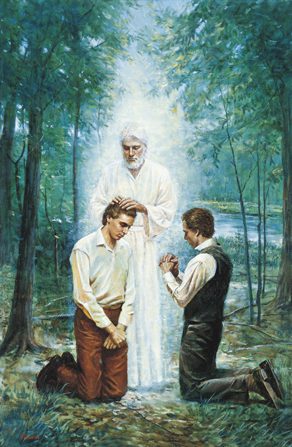
Image by Del Parsons, from LDS.org
Compare John 2:18-22
These passages represent the chief priests and scribes of Jerusalem in Jesus’ day as rather cynical political calculators.
But they also raise another matter: the issue of authority. Some visions of earliest Christianity suggest (or say outright) that “authority” meant nothing to Jesus and the primitive “Jesus movement,” which was, rather, a loose assemblage of first century counterculturists, sometimes depicted as essentially (I’ll bring them up since I’m not far away from the legendary Haight-Ashbury district) a group of hippie pacifists.
According to such views, concepts of Christian “priesthood,” a distinction between the ordained and the unordained, and a hierarchy of ecclesiastical offices — as these exist in the Roman Catholic and Greek Orthodox traditions and, more recently, in the Church of Jesus Christ of Latter-day Saints — are products of a later evolution and quite foreign to the teachings and practices of Jesus himself.
And some Christians, of course, teach the notion of a “priesthood of all believers,” which, if taken literally, would pretty much dissolve the concept of “priesthood” altogether — in much the way that, if everybody is “special” and everybody is “above average,” nobody is,
But authority clearly meant a great deal to Jesus’s critics. And, in these verses, he doesn’t say that it shouldn’t. Indeed, he seems to accept their premises: John, he implies, had divine authority for his actions, and so does he.











